短文一、现在完成时
- 格式:ppt
- 大小:140.00 KB
- 文档页数:55
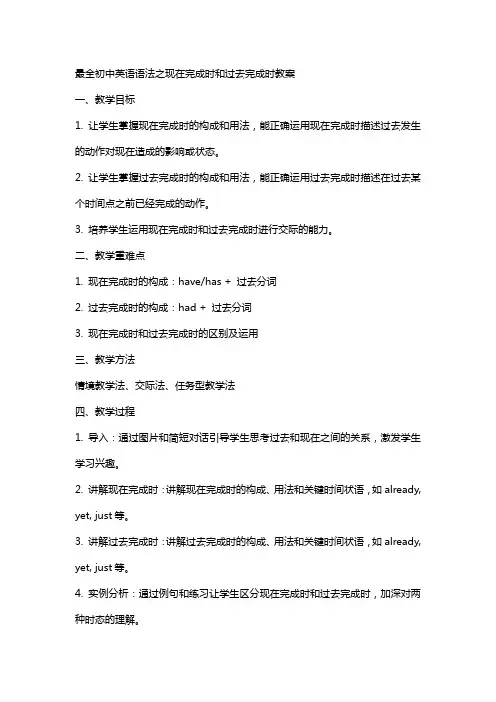
最全初中英语语法之现在完成时和过去完成时教案一、教学目标1. 让学生掌握现在完成时的构成和用法,能正确运用现在完成时描述过去发生的动作对现在造成的影响或状态。
2. 让学生掌握过去完成时的构成和用法,能正确运用过去完成时描述在过去某个时间点之前已经完成的动作。
3. 培养学生运用现在完成时和过去完成时进行交际的能力。
二、教学重难点1. 现在完成时的构成:have/has + 过去分词2. 过去完成时的构成:had + 过去分词3. 现在完成时和过去完成时的区别及运用三、教学方法情境教学法、交际法、任务型教学法四、教学过程1. 导入:通过图片和简短对话引导学生思考过去和现在之间的关系,激发学生学习兴趣。
2. 讲解现在完成时:讲解现在完成时的构成、用法和关键时间状语,如already, yet, just等。
3. 讲解过去完成时:讲解过去完成时的构成、用法和关键时间状语,如already, yet, just等。
4. 实例分析:通过例句和练习让学生区分现在完成时和过去完成时,加深对两种时态的理解。
5. 小组讨论:学生分小组讨论现在完成时和过去完成时的用法,分享学习心得。
6. 交际练习:设计情景,让学生运用现在完成时和过去完成时进行角色扮演和对话。
7. 总结:对本节课的内容进行总结,强调现在完成时和过去完成时的用法及区别。
8. 作业布置:布置相关练习题,巩固所学知识。
五、教学评价1. 课堂参与度:观察学生在课堂上的参与程度,了解学生的学习兴趣。
2. 练习完成情况:检查学生作业完成情况,评估学生对知识的掌握程度。
3. 交际能力:评估学生在角色扮演和对话中的表现,检验学生运用所学知识进行交际的能力。
4. 小组讨论:评价学生在小组讨论中的表现,了解学生的合作能力和思维能力。
六、教学活动设计1. 图片匹配:展示一系列图片,每张图片代表一个过去发生的动作,让学生用现在完成时描述这些动作对现在的影响或状态。
2. 时间线游戏:制作一个时间线,标注过去和现在的关键时间点,让学生根据时间线用过去完成时描述过去的动作。

现在完成时(Present perfect tense)现在完成时的构成形式:现在完成时由助动词have / has +过去分词构成。
(一) 现在完成时的基本用法:1. 表示动作到现在为止已经完成或刚刚完成。
e.g. I have finished my work. We have set up many new factories.2. 动作发生在过去, 强调对现在的结果、影响等。
e.g. Have you ever seen the film ―Harry Potter‖?I’ve borrowed that book.3. 表示动作发生在过去, 并且一直持续到现在, 甚至还可能继续下去, 句中使用持续性动词, 且常有表示一段时间的时间状语。
e.g. We haven’t seen each other for ten years.I’ve been an English teacher for about 20 years.4. 现在完成时可以用在条件或时间状语从句中, 表示将来某个时刻之前已经完成的动作。
e.g. I’ll go home as soon as I have finished my homework.Please lend me that book if you have finished reading it.(二) 使用现在完成时的句型1) 现在完成时+since + 点时间状语(名词、短语、从句, 其中从句用一般过去时)2) 现在完成时+ for+ 段时间状语3) It / This is the first /其他序数词/ last time + that 从句中, 从句使用现在完成时。
★注意: 在下面的句子中, 主句的谓语动词常用一般现在时:It is three years since I began to work on the farm.It’s a long time since I saw you last.4)This / It is (one of) + 形容词最高级+ n. + that从句,从句用现在完成时,如:This is the most gorgeous architecture that I have ever seen.(三)现在完成时与一般过去时的区别现在完成时表示某一已经完成的动作对现在造成的结果或影响, 强调的是现在的情况, 所以不能与表示过去的时间状语连用; 一般过去时只表示某一动作或状态在过去发生或存在过, 与现在不发生联系, 它可以与表示过去的时间状语连用。
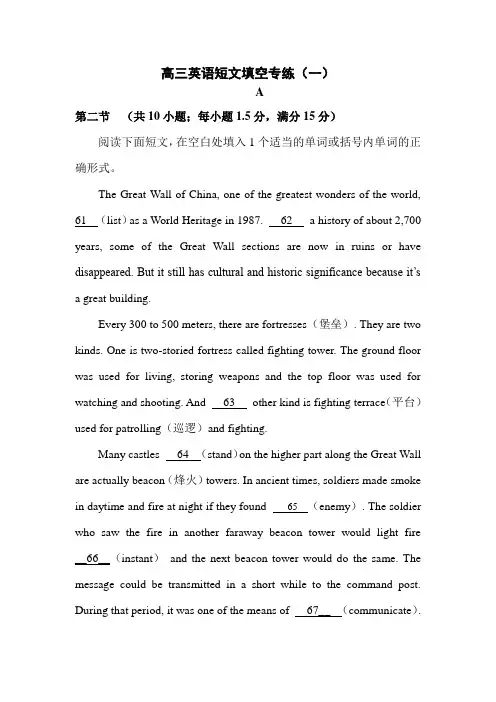
高三英语短文填空专练(一)A第二节(共10小题;每小题1.5分,满分15分)阅读下面短文,在空白处填入1个适当的单词或括号内单词的正确形式。
The Great Wall of China, one of the greatest wonders of the world, 61 (list)as a World Heritage in 1987. 62 a history of about 2,700 years, some of the Great Wall sections are now in ruins or have disappeared. But it still has cultural and historic significance because it’s a great building.Every 300 to 500 meters, there are fortresses(堡垒). They are two kinds. One is two-storied fortress called fighting tower. The ground floor was used for living, storing weapons and the top floor was used for watching and shooting. And 63 other kind is fighting terrace(平台)used for patrolling(巡逻)and fighting.Many castles 64 (stand)on the higher part along the Great Wall are actually beacon(烽火)towers. In ancient times, soldiers made smoke in daytime and fire at night if they found 65 (enemy). The soldier who saw the fire in another faraway beacon tower would light fire __66__(instant)and the next beacon tower would do the same. The message could be transmitted in a short while to the command post. During that period, it was one of the means of 67__ (communicate).When 68 (see)from high above, the Great Wall in China is like a dragon. It’s well known to people aro und the world that the Great Wall of China 69 (be)the world’s longest defense wall. From the aspects of culture and history, the wall is an ancient masterpiece 70 you can fully enjoy.这是一篇说明文。
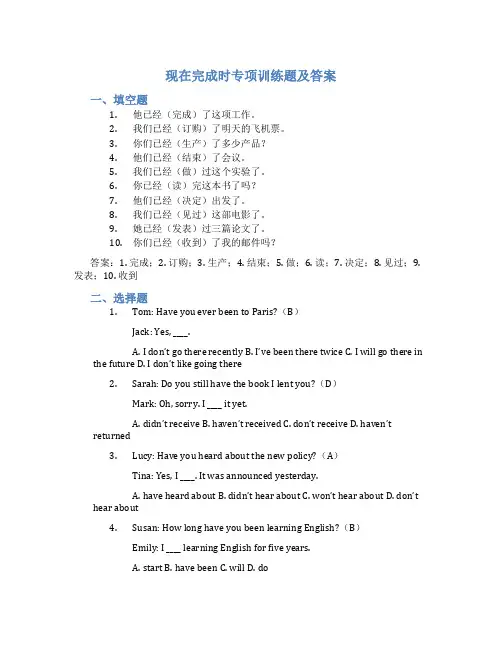
现在完成时专项训练题及答案一、填空题1.他已经(完成)了这项工作。
2.我们已经(订购)了明天的飞机票。
3.你们已经(生产)了多少产品?4.他们已经(结束)了会议。
5.我们已经(做)过这个实验了。
6.你已经(读)完这本书了吗?7.他们已经(决定)出发了。
8.我们已经(见过)这部电影了。
9.她已经(发表)过三篇论文了。
10.你们已经(收到)了我的邮件吗?答案:1. 完成;2. 订购;3. 生产;4. 结束;5. 做;6. 读;7. 决定;8. 见过;9. 发表;10. 收到二、选择题1.Tom: Have you ever been to Paris?(B)Jack: Yes, ____.A. I don’t go there recentlyB. I’ve been there twiceC. I will go there inthe future D. I don’t like going there2.Sarah: Do you still have the book I lent you?(D)Mark: Oh, sorry. I ____ it yet.A. did n’t receiveB. haven’t receivedC. don’t receiveD. haven’treturned3.Lucy: Have you heard about the new policy?(A)Tina: Yes, I ____. It was announced yesterday.A. have heard aboutB. didn’t hear aboutC. won’t hear aboutD. don’thear about4.Susan: How long have you been learning English?(B)Emily: I ____ learning English for five years.A. startB. have beenC. willD. do5.Mike: Do you know where John is?(A)Tom: Yes, ____. He has gone to the supermarket.A. I doB. I do knowC. I am knowingD. I knowing答案:1. B;2. D;3. A;4. B;5. A三、改错题请改正以下句子中的错误:1.I have went to the cinema last night.改为:I went to the cinema last night.2.She has never been see such a beautiful sunset before.改为:She has never seen such a beautiful sunset before.3.We has already finished our homework.改为:We have already finished our homework.4.Have you bought the tickets for the concert already?改为:Have you already bought the tickets for the concert?5.They have been lived in this city since 2010.改为:They have lived in this city since 2010.答案:1. I went to the cinema last night.;2. She has never seen such a beautiful sunset before.;3. We have already finished our homework.;4. Have you already bought the tickets for the concert?;5. They have lived in this city since 2010.四、对话配对题将下列对话的两部分进行配对。
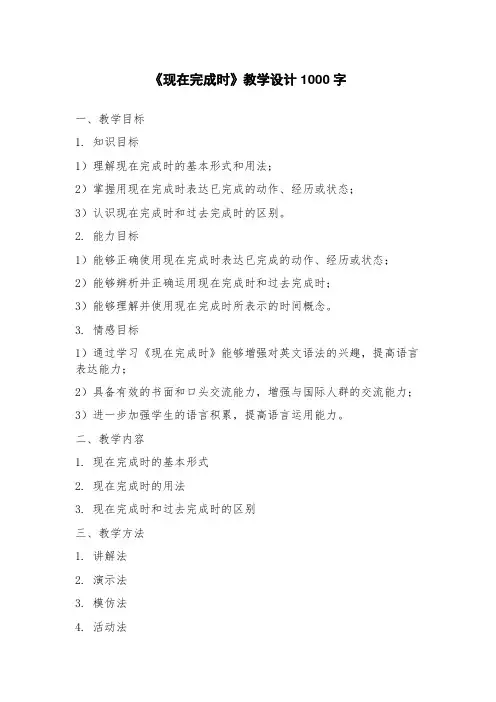
《现在完成时》教学设计1000字一、教学目标1. 知识目标1)理解现在完成时的基本形式和用法;2)掌握用现在完成时表达已完成的动作、经历或状态;3)认识现在完成时和过去完成时的区别。
2. 能力目标1)能够正确使用现在完成时表达已完成的动作、经历或状态;2)能够辨析并正确运用现在完成时和过去完成时;3)能够理解并使用现在完成时所表示的时间概念。
3. 情感目标1)通过学习《现在完成时》能够增强对英文语法的兴趣,提高语言表达能力;2)具备有效的书面和口头交流能力,增强与国际人群的交流能力;3)进一步加强学生的语言积累,提高语言运用能力。
二、教学内容1. 现在完成时的基本形式2. 现在完成时的用法3. 现在完成时和过去完成时的区别三、教学方法1. 讲解法2. 演示法3. 模仿法4. 活动法四、教学步骤1. 导入新课T:Class, do you know what the present perfect tense is? Now, please listen to a song and see if you can identify where the present perfect tense is used in the lyrics.(Old Time Rock and Roll, by Bob Seger)CT:I like that song! But what did you notice about the verb forms in the lyrics? Did you hear anything new?S1: Yes, I heard the word “have” and “has” followed by a past participle.S2: I heard “I’ve” and “you’ve” and “we’ve” before the verbs.CT: Good job! What you heard is the present perfect tense.2. 讲授现在完成时的基本形式T:Class, now let’s take a look at the form of the present perfect tense. (展示表格)I have eaten breakfast.He has seen that movie.We have played soccer.T:Notice that each sentence has two parts. The first part is the subject plus the present tense of “have” (either “has” or “have”), and the second part is the past participle of the verb. Together, they form the present perfect tense.3. 示范现在完成时的用法T:Class, now let’s look at how the present perfect tense is used. (展示表格)T:Do you understand? The present perfect tense is used to talk about something that happened at some time in the past, but we don’t know exactly when it happened.4. 练习现在完成时的用法T:Let’s practice using the present perfect tense together.I will make some sentences on the board and you can tell me if the verb form is correct or not.I have seen that movie last week.She has gone to China in 2019.We have studied English for five years.T: Which of these sentences are correct? Why?S1: “I have seen that movie last week” is incorrect because we use the past simple tense to talk about something that happened at a specific time in the past, not the present perfect tense.S2: “She has gone to China in 2019” is incorrect because we use the present perfect tense to talk about somethingthat happened at an unspecified time in the past, not the past simple tense.S3: “We have studied English for five years” is correct because we use the present perfect tense to talk about something that began in the past and continues up to the present.5. 引入现在完成时和过去完成时的区别T: Now, let’s talk about the difference between thepresent perfect tense and the past perfect tense. (展示表格)T: What do you notice about the difference between the two tenses?S1: The present perfect tense talks about things that happened recently or are still happening, while the pastperfect tense talks about things that happened before another event in the past.S2: The past perfect tense uses “had” + past participle, while the present perfect tense uses “have/has” + past participle.6. 归纳总结T: Well done. Now, let’s summarize what we have learned today. What is the present perfect tense and how is it formed?S1: The present perfect tense is used to talk about things that happened at some point in the past.S2: It is formed by using “have” or “has” with the past participle of the verb.T: And what is the difference between the present perfect tense and the past perfect tense?S3: The present perfect tense talks about things that happened recently or are still happening, while the past perfect tense talks about things that happened before another event in the past.七、作业1、根据要求改写下列句子:1. Tom has been to Paris. (对划线部分提问)2. I have lived here for ten years. (改为否定句)3. He has finished his work already. (改为一般疑问句)2、写一篇小短文,使用现在完成时描述过去一个星期内发生的事情八、板书设计Present Perfect TenseForm: Subject + have/has + past participleUse: To talk about something that happened at some point in the past, but we don’t know exactly when.例句:I have eaten breakfast. He has seen that movie. We have played soccer.区别:Present Perfect Tense: Talks about things that happened recently or are still happening.Past Perfect Tense: Talks about things that happened before another event in the past.。

Learning plan for Senior 1Present Perfect Tense& Present Perfect Continuous Tense现在完成时&现在完成进行时Part AStep I. Observe and discover (观察与发现)1. Observe and underline the tense used in the following passage.(1) Mr Zhang has just bought a new car, but he has had trouble with motorists. When he returns home at night he always find that someone has parked a car outside his gate. Because of this, he has not been able to get his own car into this garage even once. He has to walk home after he parks his car. “ what’s the matter? Have you bought a car?” “ Yes, but…” Mr Zhang has put up a “ No parking” sign outside his gate, but it has not any effect.Form(结构)_______________________ Tense_____________________________(2)Lucy and John have been living in the city for ten years. Their daughter has been learning English since she was five. They want to take her to the cinema after school. They have been waiting for her for half an hour. She finally shows up at five past five.Form(结构)_______________________ Tense______________________________2. Compare and discover the meaning behind the sentences.I have just cleaned my clothes.我刚洗过衣服. (Meaning: )I have already had my breakfast.我刚吃过早餐。
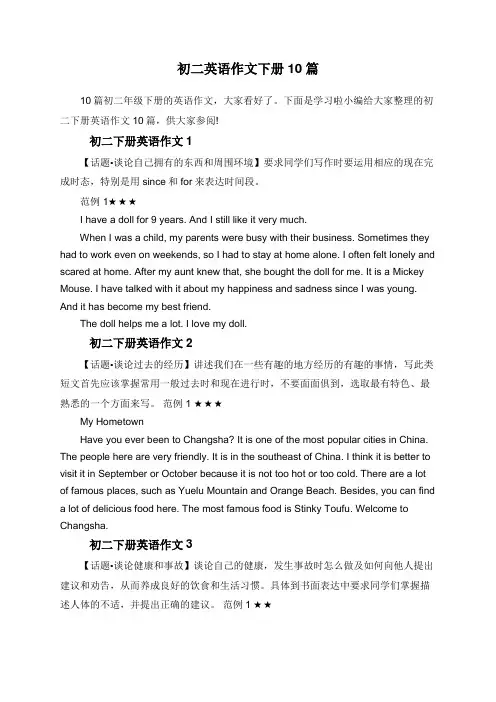
初二英语作文下册10篇10篇初二年级下册的英语作文,大家看好了。
下面是学习啦小编给大家整理的初二下册英语作文10篇,供大家参阅!初二下册英语作文1【话题•谈论自己拥有的东西和周围环境】要求同学们写作时要运用相应的现在完成时态,特别是用since和for来表达时间段。
范例 1★★★I have a doll for 9 years. And I still like it very much.When I was a child, my parents were busy with their business. Sometimes they had to work even on weekends, so I had to stay at home alone. I often felt lonely and scared at home. After my aunt knew that, she bought the doll for me. It is a Mickey Mouse. I have talked with it about my happiness and sadness since I was young. And it has become my best friend.The doll helps me a lot. I love my doll.初二下册英语作文2【话题•谈论过去的经历】讲述我们在一些有趣的地方经历的有趣的事情,写此类短文首先应该掌握常用一般过去时和现在进行时,不要面面俱到,选取最有特色、最熟悉的一个方面来写。
范例 1 ★★★My HometownHave you ever been to Changsha? It is one of the most popular cities in China. The people here are very friendly. It is in the southeast of China. I think it is better to visit it in September or October because it is not too hot or too cold. There are a lot of famous places, such as Yuelu Mountain and Orange Beach. Besides, you can find a lot of delicious food here. The most famous food is Stinky Toufu. Welcome to Changsha.初二下册英语作文3【话题•谈论健康和事故】谈论自己的健康,发生事故时怎么做及如何向他人提出建议和劝告,从而养成良好的饮食和生活习惯。
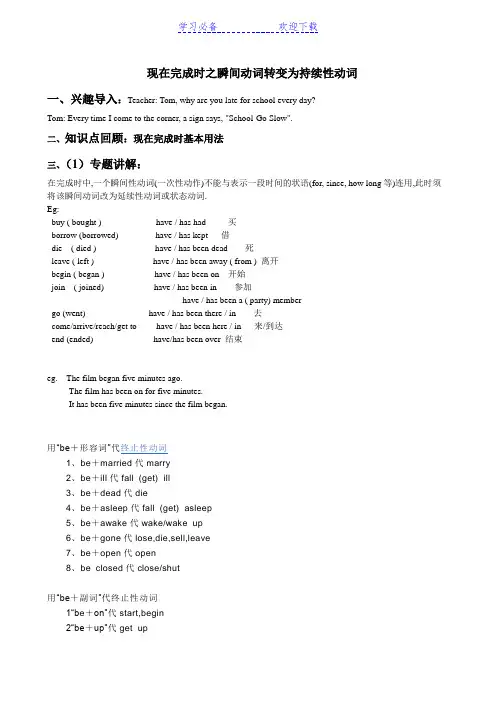
现在完成时之瞬间动词转变为持续性动词一、兴趣导入:Teacher: Tom, why are you late for school every day?Tom: Every time I come to the corner, a sign says, "School-Go Slow".二、知识点回顾:现在完成时基本用法三、(1)专题讲解:在完成时中,一个瞬间性动词(一次性动作)不能与表示一段时间的状语(for, since, how long等)连用,此时须将该瞬间动词改为延续性动词或状态动词.Eg:buy ( bought ) --- have / has had 买borrow (borrowed) --- have / has kept 借die ( died ) --- have / has been dead 死leave ( left ) --- have / has been away ( from ) 离开begin ( began ) --- have / has been on 开始join ( joined) --- have / has been in 参加--- have / has been a ( party) membergo (went) --- have / has been there / in 去come/arrive/reach/get to --- have / has been here / in 来/到达end (ended) ----- have/has been over 结束eg. The film began five minutes ago.------The film has been on for five minutes.------It has been five minutes since the film began.用“be+形容词”代终止性动词1、be+married代marry2、be+ill代fall (get) ill3、be+dead代die4、be+asleep代fall (get) asleep5、be+awake代wake/wake up6、be+gone代lose,die,sell,leave7、be+open代open8、be closed代close/shut用“be+副词”代终止性动词1“b e+on”代start,begin2“be+up”代get up3“be+back(to)”代return to,come back to,go back to4“be here (there)”代come(arrive,reach,get) here或go (arrive,reach,get) there等等用“be+介词短语”代终止性动词1.“be in/at +地点”代替go to /come to2.用be in the army 代替join the army3.“be in/at +地点”代替move to四、巩固练习:将瞬间动词变成延续性动词表:1. have arrived at/in....... got to/reached...... come/gone/moved to...... →2. have come/gone back/returned →3. have come/g one out →4. have become →5. have closed / opened→6. have fallen ill→7. have died →8. have left...... →9. have fallen asleep/got to sleep →10. have finished/ended/completed →11. have married →12. have begun →13. have borrowed/bought →14. have/has gone to →15. have joined/have taken part in the league/the Party/the army→五、拓展训练:1.你曾经吃过鱼和薯条吗?2. 我刚刚丢了我的化学书。

中考初中英语语法-现在完成时和过去完成时地区别语法----现在完成时和过去完成时的区别1.从结构上区别现在完成时:主语 + have / has + 过去分词(肯定式)主语 + have / has + not + 过去分词(否定式)Have / Has + 主语 + 过去分词(疑问式)过去完成时:主语 + had + 过去分词(肯定式)主语 +had + not + 过去分词(否定式)Had + 主语 + 过去分词(疑问式)2.从时间状语区别现在完成时: 常用的时间状语包括“now, today, tonight, this week, this year, already, yet, just, recently…etc”。
过去完成时: 常用的时间状语包括“by, at, before等构成的短语”。
注意:当表示一段时间,现在完成时和过去完成时都可以用for 或since引导的状语。
例如:Have you had your lunch yet? 你吃午饭了吗?Yes, I have . I’ve just had it. 是的,我刚吃完。
I have had a clock now. 我现在有一个闹钟了。
Have you already posted the photos? 你把照片寄走了吗?The meeting had begun when we got there. 我们到那儿时,会议已经开始了。
We had learned about 5000English words by the end of last term.到上学期末我们已经学了5000个英语单词。
They had done the work at five o’clock. 在五点钟的时候他们已经完成了那项工作。
I’ve known Li Lei for three years. 我认识李蕾已经三年了。
I have worked here since ten years ago. 自从十年前我就在这工作。

期末复习之现在完成时1. 常考点第一点:现在完成时的定义;第二点:现在完成时的四个句型(特殊疑问句、一般疑问句、肯定句和否定句);第三点:现在完成时的时间标志词;第四点:现在完成时和一般过去时的区别。
2. 常考题型覆盖题型广,单项选择、完形填空、词形变换、选词填空、短文填空、书面表达等等。
只要涉及到谓语动词的形式就和时态有关。
3. 解题技巧从时态的四个句型、时间标志词入手。
【技巧一】现在完成时只有一个结构,不用区分助动词结构和be动词结构;一般过去时分有两个结构,需要区分助动词结构和be动词结构。
Have you opened your post yet?We've lived here since 1994.He's already been gone four hours!【技巧三】连词前后(如and)或上下文的时态一致,要时态保持一致。
I was angry because I played so badly.Either he could not come or he did not want to.针对训练:一、单项选择1.She ________ all of Wang Yuan’s movies. He is her favorite singer and actor.A.is seeing B.sees C.is seen D.has seen2.Hi, Li Hong, Xiao Gang has ________ called you, where have you been?A.just now B.now C.just D.never3.With the help of Wenzhou Government, we _______ the new lift to our building. My grandparents don’t need to climb the stairs any more.A.add B.will add C.have added D.are adding4.—The days of collecting snow to use in sweet drinks ________ history.—We can enjoy sherbet and ice cream all year round.A.has become B.have become C.become D.will become5.— It takes ages to find you. Where are you?— What a shame! I ________ at home because of being closely connected with the Covid-19 carrier.A.will be B.have been C.stayed D.will stay6.Believe it or not, everything my mother ever tried to warn me about ________ true.A.comes B.has come C.had come D.was coming7.—Jack, how long have you ________ the novel?—For a week, I ________ it a week ago.A.bought; bought B.bought; hadC.kept; bought D.had; kept8.I have studied English ________ I came to this school.A.for B.and C.since D.or9.Miss Wang ________ English for twenty-two years.A.will teach B.teaches C.taught D.has taught10.—High-speed trains, mobile payment, sharing bikes and online shopping are called “four new great inventions” of modern China.—They ________ our daily lives more convenient.A.had made B.will make C.have made D.was making11.—Li Ming is a left-behind child(留守儿童). He misses his parents very much.—So he does. They ______ from the hometown for over two years.A.left B.will leave C.have left D.have been away 12.—Grace, your Chinese is much better than you first came here.—I ________ China for 15 years to learn Chinese.A.has been in B.have been to C.have gone to D.have been in13.We ________ the project by ourselves so far.A.finish B.will finish C.have finished D.are finishing14.Terry ________ eight novels in the past two years. He is called a highly productive writer.A.has written B.is writing C.was writing D.will write15.My grandfather ________ many traditional paintings since he joined the Elderly Club.A.had collected B.would collect C.collected D.has collected 16.—Where is your father?—He________ Australia. He loves travelling and he ________Australia four times.A.has been to; has been in B.has gone to; has been inC.has been in; has been to D.has gone to; has been to17.—We’ve lived here ________ 1980.—So you’ve lived here ________ about 30 years.A.since; for B.for; since C.for; for D.in; since18.—In the final of the women’s Asian Cup, China’s women’s football team won the first on February 6th, 2022.—Yes. The match ________ for over two months, but we are still very excited.A.has begun B.has ended C.has been on D.has been over 19.—Would you like to go to the concert with me tonight?—I’d love to, but I ________ Betty’s invitation to her birthday party.A.accept B.am accepting C.will accept D.have accepted20.China ________ rapid progress since the Reform and Opening-Up (改革开放) began in 1978.A.has made B.made C.is making D.makes二、用所给单词的正确形式填空21.The Chinese government recently _________ (make) a plan to set up Giant Panda National Park. 22.—Why are you still here? It’s almost six o’clock.—Because I ________ (not finish) my work. But don’t worry. There’s still a little left.23.Tintin ________ (be) popular for over eighty years.24.The man is very creative and he has ________ (create) many famous paintings.25.—How long have you ________ (be) like this?—For two days.26.—David, have you ________ (finish) your homework?—Not yet, mum. I’m still working on it.27.David and Lily____ (marry) for two years.28.The next Saturday, he ________ (plan) to go for a picnic, didn’t he?29.Mr Zhang _________ (go) to work very late yesterday.30.She ________ (put) her hands over my head and smiled.31.I ________ (catch) a very bad cold last week.32.He ________ (send) me a few postcards the other day.33.Yesterday morning, Miss Lin ________(lead) us to the science museum.34.The Blacks _____ (go) to Human already and they will stay there for a month.35.China ______ (send) up several Shenzhou manned spacecraft into space so far.36.—Guo Tao’s new book ______ (come) out.—Really? Why not go to buy one right now?37.Tom and I ________ (not see) each other since last week. I don’t know what he is doing these days.38.I ________ (keep) the books for three weeks, so I have to renew (续借) them this afternoon.39.The price of many goods ________ (rise) a lot over the past few days because of the COVID-19 all over the city.40.Nobody ________ (get) any information about the car accident. We are all worried.三、完成句子41.在某种程度上, 我爷爷到目前为止还没有习惯城市的生活。
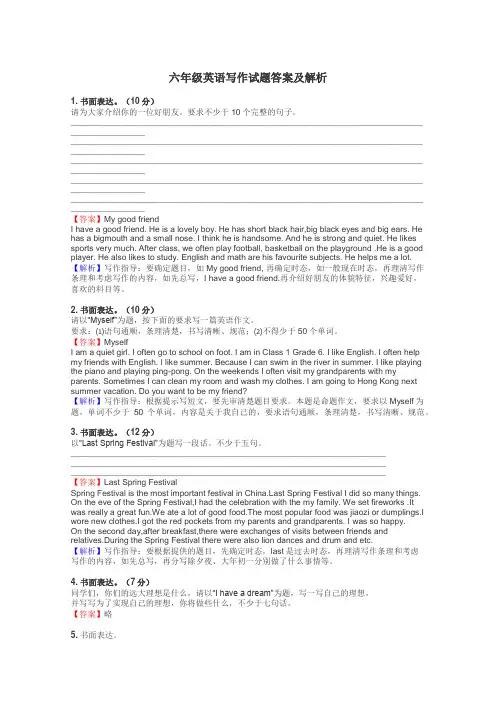
六年级英语写作试题答案及解析1.书面表达。
(10分)请为大家介绍你的一位好朋友。
要求不少于10个完整的句子。
____________________________________________________________________________________________________________________________________________________________________________________________________________________________________________________________________________________________________________________________________________________________________________________________________________________________________________________________ ________________【答案】My good friendI have a good friend. He is a lovely boy. He has short black hair,big black eyes and big ears. He has a bigmouth and a small nose. I think he is handsome. And he is strong and quiet. He likes sports very much. After class, we often play football, basketball on the playground .He is a good player. He also likes to study. English and math are his favourite subjects. He helps me a lot.【解析】写作指导:要确定题目,如My good friend, 再确定时态,如一般现在时态,再理清写作条理和考虑写作的内容,如先总写,I have a good friend.再介绍好朋友的体貌特征,兴趣爱好,喜欢的科目等。
小升初英语现在完成时小升初英语现在完成时一、现在完成时的概念现在完成时是英语时态的一种,它表示动作已经完成,并对现在产生影响。
在小升初英语中,掌握现在完成时的用法对于提高英语写作和阅读理解能力非常重要。
二、现在完成时的基本结构1、肯定句结构:主语 + 助动词have/has + 动词的过去分词例如:I have finished my homework.2、否定句结构:主语 + 助动词have/has + not + 动词的过去分词例如:They haven't seen each other for a long time.3、一般疑问句结构:助动词have/has + 主语 + 动词的过去分词例如:Have you ever been to an amusement park?三、现在完成时的用法1、表示动作发生在过去,但与现在的情况有联系,即表示现在的结果。
例如:I have lost my keys. (现在找不到钥匙)2、表示动作从过去开始持续到现在,并有可能继续持续下去。
例如:We have lived in this city for ten years. (我们已经在这个城市住了十年)3、表示动作的完成次数或动作的持续时间。
例如:The Smiths have visited China twice this year. (史密斯一家今年已经访问中国两次了)四、现在完成时的常用短语和句型1、up to now, so far, in the past few years 等短语常用于现在完成时。
例如:Up to now, we have raised a lot of money for the charity.2、It is the first/second time that... 句型也常与现在完成时连用。
例如:It is the first time that I have visited Paris.五、练习题1、-Have you seen the movie "阿凡达"? -No,I ______ it yet.A. didn't seeB. haven't seenC. would seeD. have seen2、-How many times ______ to the Great Wall? -Three times. A. have you been B. had you been C. did you go D. will you go3、-______ she ______ her homework now? -No,she ______ it.A. Is;doing;isB. Is;doing;isn'tC. Can;do;isD. Can;do;isn't答案:B A B解析:第1题表示“还没有看过”,所以用现在完成时;第2题表示“去过某地多少次”,用现在完成时;第3题第一个空表示“正在做某事”,用现在进行时,第二个空为一般疑问句,用助动词is,第三个空为否定回答,用isn't。
朗读下列短文,然后改写为现在完成时态:Morgens trinke ich zuerst meinen Kaffee.Dann wecke ich meinen Mann Kostas und die Kinder und mache unser Frühstück.Wirfrühstücken,danach fährt Kostas zur Arbeit.Ich bringe Lena und Jakob in den Kindergarten.Dort treffen sie ihre Freunde.Dann bereite ich meinen Unterricht vor und mache den Haushalt.Mittags essen Lena ,Jakob und ich zusammen zu Mittag.Nachmittags habe ich Zeit für unsere Kinder.Wir spielen,wir gehen spazieren oder besuchen Nachbarn.Abends gehe ich in die Volkshochschule und unterrichte Deutsch.Da ist mein Mann zu Hause.Die Kinder und Kostas essen zusammen zu Abend,dann bringt er die Kinder ins Bett.练习改写成现在完成时:Gestern Morgen habe ich zuerst meinen Kaffee ge trunk en. Dann habe ich meinen Mann Kostas und die Kinder ge weck t und unserFrühstück ge mach t. Wir haben ge frühstück t, danach ist Kostas zur Arbeit gefahren. Ich habe Lena und Jakob in den Kindergarten gebracht. Dort haben sie ihre Freunde getroffen. Dann habe ich meinen Unterricht vor be reit et und den Haushalt ge mach t. Gestern Mittag haben Lena, Jakob und ich zusammen zu Mittag geg ess en. Am Nachmittag habe ich Zeit für unsere Kinder ge hab t. Wir haben ge spiel t, wir sind spazieren gegangen und haben Nachbarn be such t. Am Abend ist ich in die V olkshochschule gegangen und habeDeutsch unter richt et. Da ist mein Mann zu Hause gewesen. Die Kinder und Kostas haben zusammen zu Abend geg ess en. Dann hat er die Kinder ins Bett ge brach t.颜色表示:绿色为分词及助动词;蓝色为原有不可分前缀,不加ge-;棕色为改写的时间词语,原来的词语表示“每天早上”等;。
八年级上册Unit 6现在完成时I.口语训练一、用正确的语音和语调朗读下列短文.That night, in the main square of the city, all the Trojans celebrated. They sang and danced around the horse, and made jokes about the stupid Greeks. “I haven’t laughed like this since my childhood,” the captain s aid. After the party, they lock all the gates of the city and then went to sleep.二、情景对话1.You look tired, why don’t you rest for a while?2.I always get up early in the morning. what time do you usually wake up?3.We are going to the reading room this afternoon. .what about coming with us?4.I play sports twice a week. How often do you have sports?5.Oh, I have a high fever and feel cold.三、根据所给提示简短说话请你通知班上来自美国的同学有关活动的事宜。
活动内容:参观广州博物馆集会时间:明天上午9点集合地点:学校大门口要求:1、今晚阅读广州博物馆的有关信息:2、带笔记本和笔:3、自备午餐。
II. 重 难 点III. 精讲点拨一、何时用到现在完成时 1、 未完成用法:一个动作或状态从过去开始,一直延续或重复到现在,有可能还要继续下去。
Present Perfect Tense现在完成时主谓模块1:I have been我已经是...(结果)/我已经是...有一段时间了(“可延续性”)肯定句否定句一般疑问句及回答Yes, I have. / No, I haven’t.He has been a worker. He has not been a worker. Has he been a worker?Yes, he has. / No, he has n’t.She has been a worker. She has not been a worker. Has she been a worker?Yes, she has. / No, she has n’t.It has been a worker. It has not been a worker. Has it been a worker?Yes, it has. / No, it has n’t.We have been workers. We have not been workers. Have you been workers?Yes, we have. / No, we have n’t. You have been workers. You have not been workers. Have you been workers?Yes, we have. / No, we have n’t. They have been workers. They have not been workers. Have they been workers?Yes, they have. / No, they have n’t.主谓模块2:I have done我已经做过...(结果) (“非延续性”)/我已经做...有一段时间了(“可延续性”)肯定句否定句一般疑问句及回答Yes, I have. / No, I have n’t.He has worked. He hasn’t worked. Has he worked?Yes, he has. / No, he has n’t.She has worked. She has n’t work ed. Has she worked?Yes, she has. / No, she has n’t.It has worked. It has n’t work ed. Has it worked?Yes, it has. / No, it has n’t.We have worked. We have n’t worked. Have you worked?Yes, we have. / No, we have n’t. You have worked. You haven’t worked. Have you worked?Yes, we have. / No, we have n’t. They have worked. They have n’t work ed. Have they worked?Yes, they have. / No, they have n’t.标准句子结构●主谓模块1+X+时间模块I have been a worker for 10 years. 我当员工已经有10年了。
英语作文现在完成时范文英文回答:I have been studying English for the past ten years. I started learning it in elementary school and have continued to take classes throughout middle school and high school. I have also spent time studying English abroad and have participated in several English language exchange programs. As a result of all this effort, I am now proficient in English and can communicate effectively in both written and spoken form.My English skills have been essential to my academic and professional success. I have been able to take advantage of opportunities that would not have been available to me if I did not speak English, such as studying abroad and working with international colleagues.I am confident that my English skills will continue to be an asset to me in the future, as I pursue my career and personal goals.中文回答:我学习英语已经十年了。